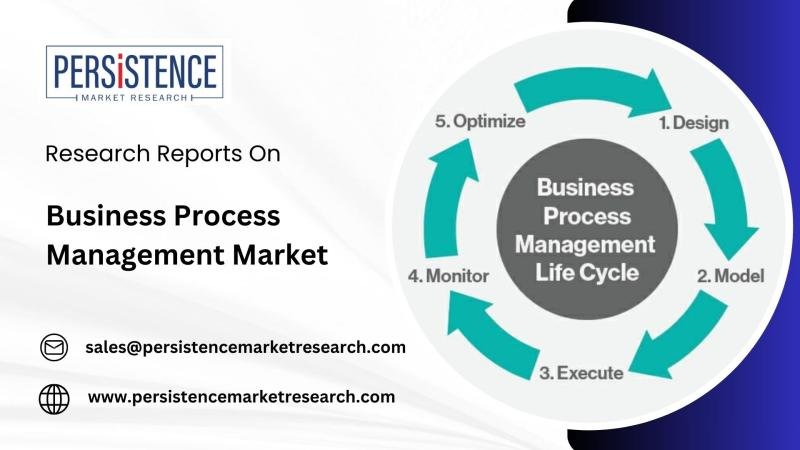The global business process management (BPM) market is experiencing rapid growth, driven by the integration of innovative technologies such as AI, machine learning, and cloud-based solutions. BPM enables organizations to optimize and automate their business operations, streamline workflows, and enhance efficiency across various sectors. According to the latest reports, the BPM market is projected to reach a market value of US$ 20.7 billion by 2024 and is expected to grow at a compound annual growth rate (CAGR) of 17.9% from 2024 to 2031, ultimately reaching US$ 65.4 billion by 2031.
Get a Sample PDF Brochure of the Report (Use Corporate Email ID for a Quick Response): https://www.persistencemarketresearch.com/samples/34973
In this article, we will explore the dynamics of the BPM market, the key factors propelling its growth, and the emerging trends that are reshaping the industry. We will also provide insights into the market’s segmentation, regional trends, and the drivers, restraints, and opportunities influencing its trajectory.
Overview of the Market
The global business process management (BPM) market is evolving rapidly with advancements in automation technologies. BPM involves the use of software and services to manage and optimize business processes, making operations more efficient and agile. A key driver behind the market’s growth is the increasing demand for automation solutions, with 64% of organizations planning to integrate AI and machine learning into their BPM systems by 2026. The integration of generative AI tools further enhances process automation, facilitating decision-making, content creation, and summarization across various sectors. In fact, businesses leveraging AI-integrated BPM have reported 30% improvement in efficiency and a 25% reduction in operational costs.
The leading geographical region for BPM market growth is North America, driven by the region’s strong focus on digital transformation and customer-centric business models. North American businesses are embracing BPM solutions to increase agility, streamline processes, and reduce operational costs. In terms of the leading segment, the service category is experiencing significant growth due to the increasing demand for consulting, implementation, and support services that help businesses optimize BPM systems. Services in the BPM space are expected to witness a CAGR of 13.3% through 2031.
Key Highlights from the Report
BPM market is set to reach US$ 65.4 billion by 2031, growing at a 17.9% CAGR from 2024 to 2031.
AI and machine learning are increasingly integrated into BPM systems to enhance automation and decision-making capabilities.
The rise of cloud-based BPM solutions is particularly benefiting small and medium-sized enterprises (SMEs), improving scalability and accessibility.
Green BPM practices, which align business processes with sustainable environmental goals, are gaining momentum across industries.
The accounting and finance segment of BPM is expected to grow at a 12.1% CAGR due to the rising need for automation in routine tasks.
Asia Pacific is projected to witness a CAGR of 13.4%, driven by the growing adoption of BPM solutions in SMEs and the shift towards cloud-based services.
Market Segmentation
Product Type and End-User Segmentation
The BPM market is categorized by product types, which include software solutions and services. The software segment is further divided into cloud-based and on-premise BPM solutions, with cloud-based solutions experiencing higher demand due to their scalability, flexibility, and cost-efficiency. The services segment comprises BPM consulting, implementation, support, and training services. Consulting and implementation services are critical as businesses look to optimize their BPM systems for better efficiency.
End-user industries leveraging BPM solutions span across various sectors, including banking, financial services, insurance (BFSI), healthcare, manufacturing, and retail. The BFSI sector is a major adopter of BPM solutions, driven by the need for process automation in areas such as invoicing, auditing, and regulatory compliance. Additionally, healthcare and manufacturing industries are increasingly adopting BPM to optimize their workflows, reduce manual errors, and improve overall operational efficiency.
Functional Segmentation
Business functions are another key area of segmentation in the BPM market. Accounting and finance functions are witnessing significant adoption of BPM software, driven by the increasing need for automation in tasks like financial reporting, invoicing, and auditing. BPM solutions, particularly those integrated with Robotic Process Automation (RPA), help streamline these processes and reduce manual intervention, making them more efficient and accurate.
Similarly, other business functions, such as customer service, human resources, and supply chain management, are also benefitting from BPM solutions. These functions rely on BPM tools to automate routine tasks, reduce operational costs, and enhance overall business agility, which is vital in today’s fast-paced business environment.
Regional Insights
North America
North America is one of the most advanced regions in terms of BPM adoption. Businesses in the United States and Canada are increasingly implementing BPM solutions to align their business processes with digital transformation objectives. The demand for BPM solutions in the region is further driven by the emphasis on customer-centricity and process optimization across industries. As digital disruption continues, organizations are leveraging BPM systems to enhance business agility, improve operational efficiency, and reduce costs.
Asia Pacific
The BPM market in Asia Pacific is experiencing significant growth, with the region expected to register a CAGR of 13.4% through 2031. The widespread adoption of internet and cloud-based technologies is a key driver for BPM solutions in the region. Many organizations, particularly small and medium-sized enterprises (SMEs), are embracing BPM solutions to automate processes and scale operations. Additionally, the rise of digital transformation initiatives in countries like China, India, and Japan is boosting the demand for BPM solutions in various sectors, including manufacturing, retail, and healthcare.
Market Drivers
One of the major drivers of the BPM market is the increasing reliance on hyperautomation, which combines technologies like AI, machine learning, and robotic process automation (RPA) to automate complex business processes. Hyperautomation helps organizations optimize workflows, reduce human errors, and enhance decision-making capabilities. The growing importance of cloud-based BPM solutions is another key driver, offering businesses the flexibility and scalability needed to adapt to changing market conditions.
Moreover, organizations are increasingly adopting Green BPM practices to align their business operations with sustainability goals. The need to comply with environmental, social, and governance (ESG) regulations is pushing companies to adopt processes that reduce energy consumption, waste, and carbon footprint.
Market Restraints
While the BPM market is witnessing rapid growth, several challenges can hinder its expansion. One key restraint is the high initial implementation cost of BPM systems, particularly for small businesses and startups. Although cloud-based BPM solutions are more affordable, the upfront costs for consulting, integration, and training can be a barrier for some companies.
Another challenge is the complexity of implementation, especially in large organizations with intricate workflows. Businesses may struggle to integrate BPM solutions with existing systems, which can result in extended deployment times and additional costs. Additionally, the lack of skilled professionals to implement and manage BPM systems can further impede the market’s growth.
Market Opportunities
The growing demand for low-code/no-code BPM platforms represents a significant opportunity for the market. These platforms allow business users, without technical expertise, to design and automate workflows, making BPM solutions more accessible to a wider range of users. As more businesses look to optimize their processes without relying heavily on IT resources, low-code/no-code platforms are expected to gain traction in the coming years.
Moreover, the increased adoption of AI-driven BPM solutions presents another opportunity for growth. AI can significantly enhance process automation, decision-making, and predictive analytics, which can help businesses improve efficiency and reduce costs. As AI and machine learning technologies continue to advance, BPM solutions will become even more powerful and effective at addressing complex business challenges.
Reasons to Buy the Report
✔ Comprehensive market analysis covering the global BPM market size, growth trends, and regional dynamics.
✔ Insights into the latest BPM technologies, including AI, machine learning, and cloud-based solutions.
✔ Actionable intelligence on emerging market trends, such as Green BPM practices and low-code/no-code platforms.
✔ Detailed market segmentation analysis based on product type, end-user, business function, and region.
✔ Future growth opportunities and strategic recommendations for businesses looking to expand in the BPM market.
Company Insights
Key players operating in the Business Process Management Market include:
IBM Corporation
Oracle Corporation
Appian Corporation
Bizagi
TIBCO Software
Software AG
Pega Systems
Recent Developments
IBM recently launched a new AI-powered BPM platform that leverages advanced analytics and machine learning to streamline business processes.
Appian unveiled its low-code BPM tool, allowing organizations to rapidly design and deploy custom business workflows with minimal technical expertise.
The Business Process Management Market continues to evolve with the integration of innovative technologies. With the rise of automation, AI, and cloud solutions, businesses are increasingly adopting BPM tools to optimize processes, improve efficiency, and drive cost reductions.
Contact Us:
Persistence Market Research
G04 Golden Mile House, Clayponds Lane
Brentford, London, TW8 0GU UK
USA Phone: +1 646-878-6329
UK Phone: +44 203-837-5656
Email: sales@persistencemarketresearch.com
Web: https://www.persistencemarketresearch.com
About Persistence Market Research:
At Persistence Market Research, we specialize in creating research studies that serve as strategic tools for driving business growth. Established as a proprietary firm in 2012, we have evolved into a registered company in England and Wales in 2023 under the name Persistence Research & Consultancy Services Ltd. With a solid foundation, we have completed over 3600 custom and syndicate market research projects, and delivered more than 2700 projects for other leading market research companies’ clients.
Our approach combines traditional market research methods with modern tools to offer comprehensive research solutions. With a decade of experience, we pride ourselves on deriving actionable insights from data to help businesses stay ahead of the competition. Our client base spans multinational corporations, leading consulting firms, investment funds, and government departments. A significant portion of our sales comes from repeat clients, a testament to the value and trust we’ve built over the years.
This release was published on openPR.
















